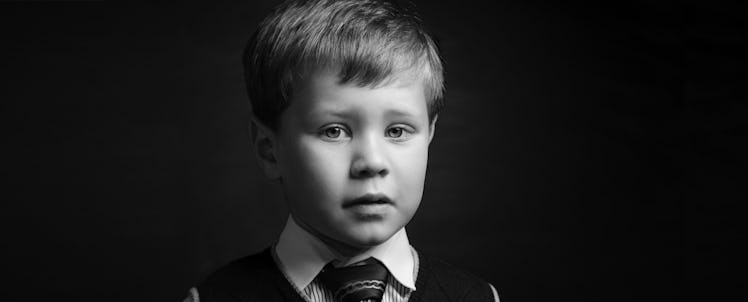Trump Says It’s a Scary Time for Boys. He’s Right.
The #metoo movement has caused young men to fear what’s coming and feel anger about what’s being lost. President Trump feels it, but that doesn’t mean there’s a solution.

In a Tuesday interview with the White House press corps, President Donald Trump was asked if he had a message for young men. “It’s a very scary time for young men in America when you can be guilty of something that you may not be guilty of,” he quipped. It was a doozy of a statement designed to light up the wires. But it also contained the germ of truth. Though there’s little reason for young men to fear fake rape allegations, which are perishingly rare, it is a scary time for young men in America. Even teenagers educated enough not to buy the misogynist narrative implied by POTUS have to face the fact that the social role of the American man is increasingly poorly defined. Boys are being raised to be tough, tender, caring, and aggressive, meeting countervailing demands from different constituencies.
And, yeah, it’s frightening. That doesn’t make social change bad. It simply means that, as the President says, boys may be anxious.
It should be noted that when Trump was speaking about “young men in America,” it’s fairly clear he was speaking about young white men in America. Young black men have long feared — for very good reason — that they might be accused of crimes they did not commit. Blacks boys know don’t who Emmett Till was, surely know the name Trayvon Martin. But Trump wasn’t speaking about that community. He rarely does.
The President was gesturing toward a specific anxiety experienced not entirely uniquely, but certainly strongly by young white men who feel at risk of being vilified by the #MeToo movement and the progressive push for representation. The specific anxiety? That poorly understood privileges will be lost in poorly understood ways. The Senate Judiciary Hearings and the FBI investigation into allegations of sexual assault leveled against Brett Kavanaugh have exposed these fears as both common and politically powerful. Though Kavanaugh’s supporters are a mixed group of anti-abortion diehards and party loyalists, the frequently voiced concern that his life has been ruined points to the more ambiguous concerns many men have that they might face similar ruination. Boys have these fears too. These fears are contagious (and easily exacerbated by a careless national leader).
It’s worth repeating that raising a generation of boys to fear the consequences of their own actions is a good thing. Less assault is good. Less rape is good.
But poorly defined anxiety or, worse, antipathy toward women are not good. Stress hurts kids. If boys are wandering around worried about being accused or just worried about sexual politics in a looser sense, that’s not ideal. Fortunately, we can give those boys guidance without prioritizing their privilege over the wellbeing of others. We don’t have to choose boys or girls.
But the old “boys will be boys” narrative, decried by many and certainly poisonous to many young men, needs to be replaced with a new story. And political leaders aren’t telling that story. Republicans aren’t telling it. Democrats aren’t telling it. What is the opposite of toxic masculinity? Hard to say. We’re good at defining and talking about negative male traits. It’s hard to talk about positive male traits because we don’t want to assign those to just one gender — we’ve done that before and it didn’t work out.
Which is all to say that the boys are fearful because no one is making a convincing case that they shouldn’t be. No one is making a convincing case that equality brings harmony and long-term good. And that’s not going to happen if the conversation around masculinity continues to orbit accusations of sexual violence.
Anxiety and fear tend to exist in the absence of open dialogue. What would be most helpful for young men is to talk honestly about their feelings related to the current cultural shift? Surely someone somewhere is facilitating this dialogue, but it’s not happening in the open. It’s not happening in the spotlight. It’s not happening on the White House lawn.
The question now is whether anyone is concerned enough about the wellbeing of all young people to talk to them and, without playing politics, try to create a better understanding.